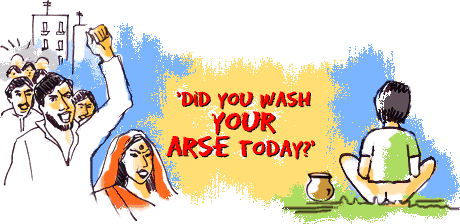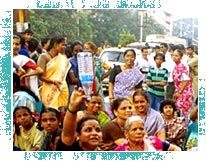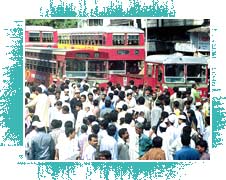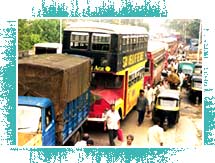
|
HOME |
NEWS |
REDIFF DIARY
|
Saisuresh Sivaswamy |
|
But my experience on the grandly titled Western Express highway last night, when I spent more than four hours stuck in one single spot, call for some expatiation. If for no other reason, then, for the cause of the logjam: denizens of the jhopadpattis that line the highway, for whom the road's expansive shoulder turn into an alfresco public convenience come sundown and before sunup, had put up roadblocks. For they had no water to clean up after the deed was done, and took to the streets to force the traffic, and thus the city, to a standstill. And make People Like Us realise their trauma. For those who came in late, the latest crunch for Bombayites came with the largest union in the Brihanmumbai Municipal Corporation demanding ex-gratia and going on an illegal strike when it was not met. This, as citizens of this metro will testify, is an annual feature. The union always goes on a strike before Diwali; the administration always buckles under, but pleads a financial straitjacket and offers to pay around two-thirds of the amount now and takes out an IOU for the following April. Comes the month but the IOU is not honoured, and guess what? The union once again goes on a strike, just on the eve of the monsoons. Garbage piles up, nullahs choke, and the city is flooded... This is as good as any fire-dance you will witness. The difference this year was that the civic employees, before walking off their no doubt harrowing jobs, shut off the water valves across the city -- taking care, according to one newspaper report, to ensure that the ones to their quarters stayed open. And the citizens, who have been putting up with loads of shit from their rulers of various political persuasions day after day, week after week, month after month, year after year, decided to come out on the streets and block the traffic. As tactics go, this may have the finesse of shooting yourself in the foot, but I do approve of it. For the 15 years that I have made this city my home, I have watched with growing horror and dismay the degeneration in the city's civic infrastructure. Taking advantage of the widespread public apathy -- after all, in the financial capital what else does one do but run after Mammon? -- the administration, be it of the Congress, the Shiv Sena-BJP, has run the city to the ground. And no, the reason is not any financial desideratum as the administration would claim, but simple financial mismanagement. Residents of the city pay among the highest quantum of civic taxes, but what do they get in return? A pile of garbage that claims to be the country's urbs prima Indis, drains that clog more than pass, trains that would put Hitler's cattle boxes to shame, roads that belong more to the moon's surface... one could go on. A friend who comes from a clean city in the South cannot marvel at one's endurance in continuing to live here. There is a spirit to this city, that even she can see grudgingly, that makes people like me, and millions of others, come here, love here, live here... And this spirit simply refuses to be broken, as I saw for myself on the highway last night.
On the incoming lane, there was not a vehicle in sight, but just masses of people, locals, predominantly Muslims -- this was among the worst-hit areas of the 1993 riots -- but Hindus as well. They were not slum-dwellers in the strictest sense as you will find in, say, Dharavi. They were people who live in one-room tenements, with common toilets. Come nature's call, the loo is occupied, or meant for the use of the womenfolk, so the menfolk squat by the roadside... mostly in the night, their metabolism finetuned by years of habit. They are not slum-dwellers, who are mostly resigned to a life of deprivation; these are not PLUs. What these are, are the real tadipaar-log, those who live beyond the pale of civilisation, or to borrow from yesteryear's hit, the Nowhere Men. Nobody bothers about them, their needs, their troubles, except at election time. And yet, these are the people on whose backs roll this huge metropolis. They are our dhobi, our milkwallah, our bai, our tailor, our driver... people whose existence we so take for granted but which we overlook so easily. Except when they stand up and ask for, well, not their rights, but paani. Water. Not to drink, not to wash clothes, not to cook, but for something much more basic. "Tum log ne aaj gaand dhoya na," one of them asked us. "Did you wash your arse today?" That question shook me to the core. It needed no response, not that I, the journalist with a quip for all situations, had one ready. "Haan, tum log ne to kiya hoga... hamara yahan teen din se paani nahi. Hum kya kare? Tum log ke ghar mein biwi hogi, bachche honge, log pareshan hain. Aaplog ke paas mobilephone hai, bol sakte ho tumko kya hua. Par hamari taqleef kaun sunega? [Yeah, you people are all right, but we have not had water for three days now, so what do we do? You have a wife at home, children awaiting your return, they are worried when you are late, you have a cell phone to call and tell them. But who will listen to us?]" went an anguished teenage participant in the blockade. The buildings of all of us affected in the blockade had not received water that morning, I dare not say. No, we were not affected to the extent that these people have been. Years ago, as a teenager in Madras, I remember being moved by Komal Swaminathan's path-breaking Tamil play, Thanneer Thanneer, later made into a film by K Balachander. It tells the simple story of a village's struggle to get water, but in a devastating manner. "Kundi kazhuva kooda inge thanni illai sir [we don't have water even to wash our arse here]," one of the lead characters delivers in a wry manner that shakes me to the core even today when I think about it. If that film shook me out of the adolescent worldview that there was no want, this experience brought home, like no printed word, no sound byte can, of citizens' power. No water, here in Bombay, the City of Gold? While you are amazed by that, just think of the genius in the civic administration in coming out with the brainwave against crapping in public. Using water cannons against those who defecate in public! As if people would crap in open if they had toilets. Rather than build public toilets, those who run the city would rather airbrush them out of existence. This is exactly the thinking that has brought about the present crisis. Fuelling the protesting multitude's anger is that hours after the civic strike was called off, with the administration doing its habitual genuflection, not a drop of water had materialised in the taps. I am willing to put my money on the fact that 1) civic union leader Sharad Rao who brought about the latest imbroglio is the most-hated man in Bombay as of now, 2) the taps in his house did not run dry even for a minute, and 3) he has given the civic workers whose cause he claims to espouse, a terrible name among the population. In fact, given the extent of protests, and public anger, I am surprised he has not come to any physical harm so far... But was I entirely happy with the protests? Yes and no. I am happy that the worm has finally turned, for I believe Bombay, with its gross disparities, is the ideal recipe for a violent eruption which alone will drive some sense into our worthless rulers that, no, they cannot take the city for granted any longer.
I would have been happier if the people had instead marched to Mantralaya, the civic headquarters, the ward offices, the corporators' houses, perhaps even Breach Candy hospital, gheraoed them -- yes, even defecated outside these places. If these exalted men don't realise what they have put the people through, let them learn a lesson that they will not forget in a hurry. "Humne traffic poore sheher mein bandh kar diya... abhi pradhan mantri ko bhi hamari taqleef maalum padgaya hoga [the traffic all over the city has stopped, now even the prime minister will know what we want...]" Hopeful words, yes, but effete I think. Does the prime minister, ensconced in the poshest private hospital in the city, know about the city's travails? Does he care? Does *anyone* care what happens in the suburbs? A month ago residents of Mira Road, just outside the city's boundaries, stopped trains because their taps ran dry and their pleas fell on deaf ears. A solution was drummed up only *after* they took to the streets... If there are cracks on the road outside Raj Bhavan, it will become front-page news. If Malabar Hill goes without water for a day it calls for a ministerial Council of War. But power-cuts, bad roads, water problems, are all par for the course in the suburbs, where *most* of the city's population lives. But no one cares. And since the people who were stuck on the road for hours were all suburbanites like me, they could understand the anger, the frustration, the desperation that brought men and women, old and young, out on the streets. We silently empathised with the protestors. Two hours later, comes a police van with a biggie inside. It is immediately gheraoed, and taken to a corner, where another wireless van has been forced to park. There are a couple of ambulances in evidence, in anticipation of any trouble. There are hundreds of protestors on the road, and the remarkable thing is that it is entirely peaceful. "Shanti rakho, shanti rakho [keep the peace]," urge the few vocal ones who naturally assume the role of leaders. The constables, embarrassed to be asked about their toilet, admit that there was no water in their homes either, and that they sympathise with the people. But please clear the roads, don't stop the traffic, urges the bigwig. "Paani do, paani do [give us water]," he is shouted down. It is quite remarkable when you think about it. So the water valves have been shut, fine. But is reopening them more complicated than, say, rocket technology, or brain surgery? In a city of 100 million, among who are some of the best brains, best talent in the country, is there no one barring these no doubt superlatively qualified civic workers who can reopen a goddamn water valve? The answer obviously is a 'No', as the police officer's inability to address the core demand testifies. What is also remarkable is that there is no political initiative to claim the leadership of these spontaneous protests.
"Sab chor hain [they are all thieves]," nods Salim. "All they did was build poor quality flyovers, and you can't even crap on them...' Nor can you drive on them, I almost tell him. In the meantime, there is minor commerce going on. Aquafina mineral water is being vended, as is chai -- "iska paani kahaan se mila [where did they get water for it?]?" asks a BEST bus driver rhetorically -- and soft drinks and cigarettes. Cars have shut off air-conditioning, tape decks are on, drivers are lolling around. Being stuck together brings out the spirit of camaraderie in men who otherwise view each other as Schumacher does Hakkinen... "'We left home at 2 pm to catch a 5 pm train and reached the station just 5 minutes late. And guess what, the train left on time today of all days... When I went to collect my refund, most of the passengers were there at the window!" says a central government employee in the jeep behind me. Calamity also brings out the human side, which is often left behind in one's hurry to earn that extra buck. So it is that water bottles are loaned out, the use of cell phones offered, and ambulances are not detained. At around 12.30 am, after nearly four hours of camping out on the highway, a white Ambassador with flashing light on top drives in. And some 15 minutes later, there has been just a little bit of success in persuading the protestors, since the traffic starts inching forward. Engines rev back to life, lights come on, doors are shut, horns honked... sounds that would normally irritate but are as welcome as Lord Balaji's Suprabhatham this time. The protestors are still not fully done, I realise as I step on the gas. A small crude bomb is thrown at my windscreen, a crazy almost launches himself into my car as it scratches through...
Then it strikes me, as I pull into my gate 20 minutes later, that no headlights had followed me, and that I and the vehicles before me were the ones lucky who got away...
|
||
|
HOME |
NEWS |
CRICKET |
MONEY |
SPORTS |
MOVIES |
CHAT |
BROADBAND |
TRAVEL ASTROLOGY | NEWSLINKS | BOOK SHOP | MUSIC SHOP | GIFT SHOP | HOTEL BOOKINGS AIR/RAIL | WEDDING | ROMANCE | WEATHER | WOMEN | E-CARDS | EDUCATION HOMEPAGES | FREE MESSENGER | FREE EMAIL | CONTESTS | FEEDBACK |
||



